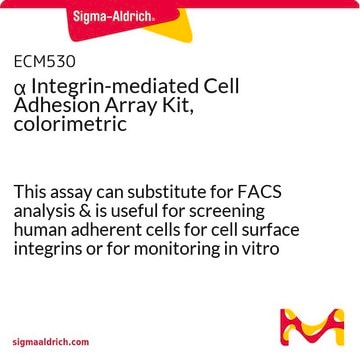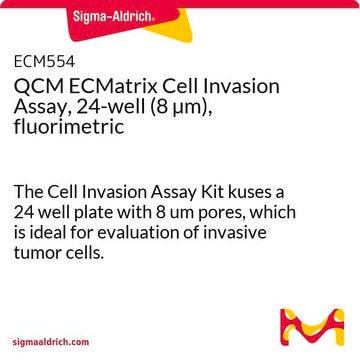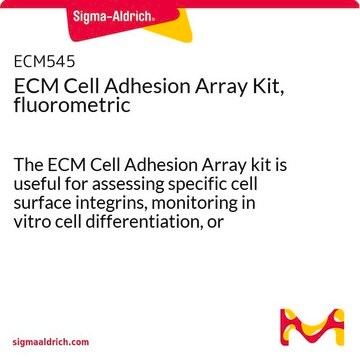ECM534
β Integrin-mediated Cell Adhesion Array Kit, fluorimetric
The Beta Integrin-Mediated Cell Adhesion Array Kit can be used for assessing the presence or absence of specific integrins on the cell surface.
Se connecterpour consulter vos tarifs contractuels et ceux de votre entreprise/organisme
About This Item
Code UNSPSC :
12352207
eCl@ss :
32161000
Nomenclature NACRES :
NA.32
Produits recommandés
Niveau de qualité
Espèces réactives
human
Fabricant/nom de marque
Chemicon®
Technique(s)
cell based assay: suitable
Numéro d'accès NCBI
Méthode de détection
fluorometric
Conditions d'expédition
wet ice
Informations sur le gène
human ... ITGB1(3688)
Application
Research Category
Cell Structure
Cell Structure
The Beta Integrin-Mediated Cell Adhesion Array Kit can be used for assessing the presence or absence of specific integrins on the cell surface.
The CHEMICON® Beta Integrin-Mediated Cell Adhesion Array Kit can be used for assessing the presence or absence of specific integrins on the cell surface. This assay can substitute for FACS analysis (6) and is useful for screening human adherent cells for cell surface integrins or for monitoring in vitro cell differentiation or genetic modification of cells.
For Research Use Only. Not for use in diagnostic procedures.
For Research Use Only. Not for use in diagnostic procedures.
Conditionnement
96 wells
Composants
Beta Integrin Array Plate: (PN: 90600) One 96-well plate with 12 strips. Each strip contains one well each of the mouse anti-beta integrin monoclonal antibodies: (beta1, beta2, beta3, beta4, beta6, alphaVbeta5, and alpha5beta1), and one goat anti-mouse negative well. See the plate layout on insert data sheet.
4X Cell Lysis Buffer: (Part No. 90130) One bottle - 16 mL
CyQuant GR Dye: (Part No. 90132) One vial - 75 μL
Assay Buffer: (Part No. 90601) One bottle - 100 mL
4X Cell Lysis Buffer: (Part No. 90130) One bottle - 16 mL
CyQuant GR Dye: (Part No. 90132) One vial - 75 μL
Assay Buffer: (Part No. 90601) One bottle - 100 mL
Stockage et stabilité
The Beta Integrin Array Plate can be stored at 2° to 8°C in the foil pouch up to its expiration date. Unused strips may be placed back in the pouch for storage. Ensure that the desiccant remains in the pouch, and that the pouch is securely closed. Keep the remaining kit components at 2° to 8°C.
Precautions
No data is available on the biological toxicity of CyQuant GR™ dye. This reagent binds to nucleic acids, and as such, should be treated as a potential mutagen which may cause cancer and heritable genetic damage. Handle with caution. The DMSO stock solution should be handled with special caution as DMSO can facilitate the entry of organic molecules into tissues.
Precautions
No data is available on the biological toxicity of CyQuant GR™ dye. This reagent binds to nucleic acids, and as such, should be treated as a potential mutagen which may cause cancer and heritable genetic damage. Handle with caution. The DMSO stock solution should be handled with special caution as DMSO can facilitate the entry of organic molecules into tissues.
Informations légales
CHEMICON is a registered trademark of Merck KGaA, Darmstadt, Germany
GR is a trademark of Sigma-Aldrich Co. LLC
Clause de non-responsabilité
Unless otherwise stated in our catalog or other company documentation accompanying the product(s), our products are intended for research use only and are not to be used for any other purpose, which includes but is not limited to, unauthorized commercial uses, in vitro diagnostic uses, ex vivo or in vivo therapeutic uses or any type of consumption or application to humans or animals.
Mention d'avertissement
Danger
Mentions de danger
Conseils de prudence
Classification des risques
Aquatic Acute 1 - Aquatic Chronic 2 - Eye Dam. 1
Code de la classe de stockage
10 - Combustible liquids
Certificats d'analyse (COA)
Recherchez un Certificats d'analyse (COA) en saisissant le numéro de lot du produit. Les numéros de lot figurent sur l'étiquette du produit après les mots "Lot" ou "Batch".
Déjà en possession de ce produit ?
Retrouvez la documentation relative aux produits que vous avez récemment achetés dans la Bibliothèque de documents.
Matthias Rath et al.
Cellular and molecular life sciences : CMLS, 79(6), 340-340 (2022-06-07)
Cerebral cavernous malformations (CCM) are low-flow vascular lesions prone to cause severe hemorrhage-associated neurological complications. Pathogenic germline variants in CCM1, CCM2, or CCM3 can be identified in nearly 100% of CCM patients with a positive family history. In line with
Notre équipe de scientifiques dispose d'une expérience dans tous les secteurs de la recherche, notamment en sciences de la vie, science des matériaux, synthèse chimique, chromatographie, analyse et dans de nombreux autres domaines..
Contacter notre Service technique









